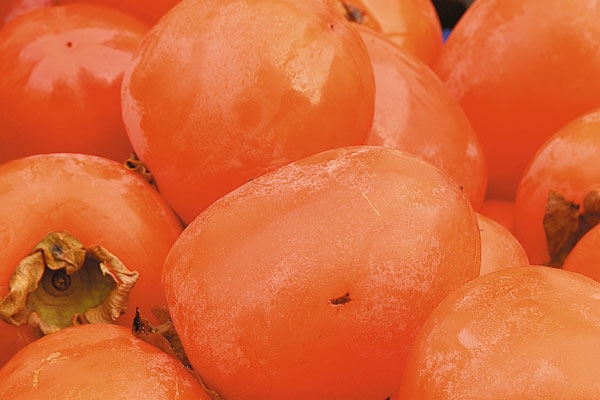Why does Persimmon Flesh Become Softer when Put into a Pot with Liquor?

Question sent by IRENE MAYOR SÁNCHEZ (La Vila Joiosa). DANIEL CLIMENT and ESTEVE SOLER answer:
Tannins, complex substances inside the group of polyphenols that coagulate certain proteins, are responsible for the mouth feeling of roughness and dryness when eating persimmons. Mucins, proteins present in buccal mucosa, are one of these proteins, which, combined with tannins, confer this feeling of roughness –astringency– when persimmons are eaten.
Tannins are present in the cells of many fruits while they are still «green», but they decompose as the fruit ripens. It is a sort of defence against herbivores (which avoid these flavours) while seeds are not ready to be scattered yet.
Persimmons lose their roughness when they become ripe, but this carries an undesired consequence— the loss of their turgidity. The resulting weak pulp is a problem for their subsequent transportation and commercialization. We can accelerate the ripening process by exposing the fruit to ethylene, which can be expelled either by another ripe fruit or by injecting it into the chambers where the fruits are preserved.
Tannins in fruits are soluble in water and alcohol, so, if one of these liquids managed to penetrate the persimmon and get into its cells, they would transform its tannins and thus remove the astringency in them before they are fully ripe.
Although fruits have an impermeable skin, this has small holes or stomata through which to exchange gases (so that cells are able to breathe while still alive, or to expel gases during the ripening process). That is why, in a rich water/gas or alcohol/gas atmosphere, these elements reach the cells through the stomata and thus deactivate the tannins in the fruit. However, it is very important not to raise their temperature, because this could damage the fruits.
Nevertheless, to obtain water/gas rich atmospheres, high temperatures are needed, for in normal conditions the proportion of evaporated water is limited. But alcohol, having a low boling point, evaporates quickly and allows to obtain rich alcohol/gas atmospheres by just pouring a small quantity in a container and covering it.
Taking into account that the alcohol sold in pharmacies sometimes contains disagreeable substances to the taste, it is preferable to use alcoholic beverages.
Basically, this is why persimmons are usually let to ripen inside containers with alcoholic beverages: the alcohol in the atmosphere that surrounds the fruits makes that small quantities penetrate, deactivate the tannins and make persimmons lose their roughness without modifyng its taste, texture, fineness, aroma or colour.
Daniel Climent and Esteve Soler.





